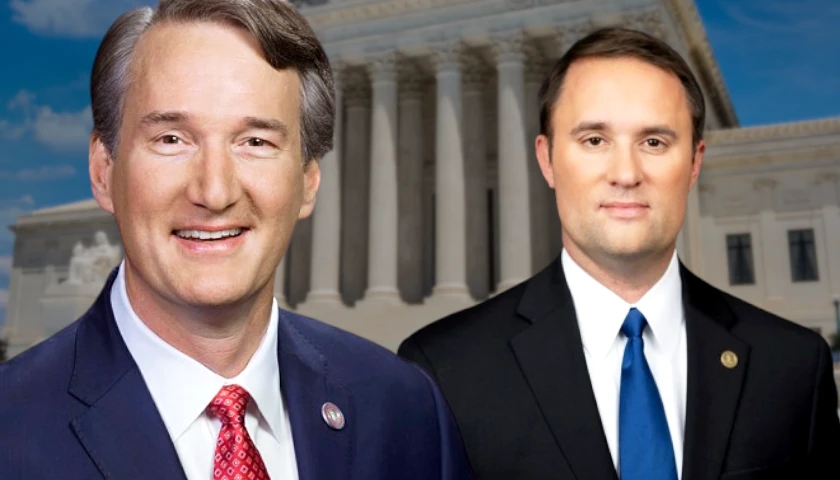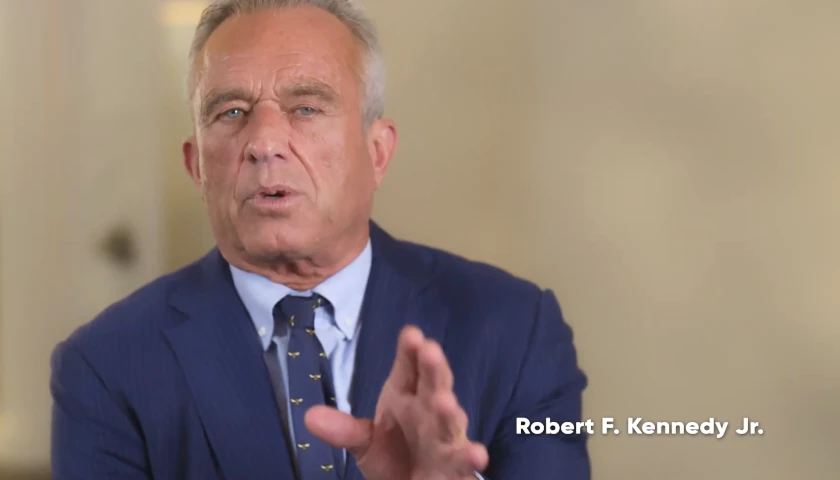A bill currently before the state legislature, being referred to as “true constitutional carry,” is actively being opposed by representatives of Governor Bill Lee’s office, even though his constitutional carry legislation was supposedly passed into law in 2021.
In February 2020, Lee held a press conference in the old supreme court chambers in the state capitol, surrounded by more than 40 members of the Tennessee General Assembly, to announce that he would be introducing legislation supporting the God-given and constitutionally-protected Second Amendment rights of Tennesseans with a Constitutional Carry bill.
In mid-March 2020, COVID shutdowns prevented the bill from moving forward during that legislative session.
During the 2021 legislative session, the “administration bill” was reintroduced as SB0765 and HB0786, sponsored in accordance with the rules by the respective majority leaders Senator Jack Johnson (R-Franklin) and Representative William Lamberth (R-Portland).
The bill passed and went into effect on July 1, 2021, as Public Chapter 108.
The Tennessee Firearms Association (TFA) analyzed the law under the meaning of constitutional carry as “any individual who can legally possess a firearm has the constitutionally protected right to carry that firearm on substantially all publicly owned properties without any infringement.”
With exclusions on 18- to 20-year-olds, reference to “handguns” rather than the broader category of “arms,” as well as continuing existing and creating new infringements and many other issues, according to TFA’s comprehensive analysis, the law does not qualify as constitutional carry.
In the 2023 legislative session, Representative Rusty Grills (R-Newbern) and Senator John Stevens (R-Huntingdon) have brought forward HB1005 and SB1503, respectively.
While the Senate has taken no action on the bill, HB1005 has been heard in the House Civil Justice sub and full committee.
During the subcommittee hearing on February 21, Representative Chris Todd (R-Madison County) who is carrying the bill, reviewed the four things the legislation accomplishes that essentially resolves issues with the bill passed in 2021.
Once Todd finished presenting the bill, members of the administration came forward to testify.
Elizabeth Stroecker, Legislative Director for the Department of Safety, summed up the situation for the committee about the previous legislation by saying that the current bill completely deletes the constitutional carry law, “which means that it is true constitutional carry for lack of a better phrase.”
Stroecker went on to say that the legislation creates a logistical issue for the department relative to permits, before the Department of Safety’s Colonel Matt Perry said he had a few safety concerns for law enforcement related to the idea of someone being able to carry any kind of rifle.
Grills questioned Perry on his use of the term “average person,” to which Perry had no answer. Perry did, however, agree that it would be beneficial for the average person to be able to defend themselves, “but not necessarily rifles and higher capacity weapons. Smaller handguns as they are now.”
Pressing Perry further, Grills asked about the difference in functionality between weapons described as pistols and long guns. Perry’s response was, “I don’t think someone should be able to carry the one.”
“We have established over and over again through supreme court cases,” Grills responded, “that the individual has a right to keep and bear arms for their protection.”
“It’s our job as legislators, in my opinion,” Grills said, “to make sure that every Tennessean’s constitutional rights are protected, and I took an oath to make sure that I did that. And I feel like voting for and pushing this legislation is something that I have to do from a constitutional perspective, because I owe 69,806 people back home that I plan on and intend to defend their right to keep and bear arms.”
Going back to Todd, his first question for the department’s witness was who they were there on behalf of to testify. “Who do you represent,” Todd asked.
“The governor’s office and the Department of Safety,” Stroecker responded.
“So, you’re not here in your personal capacity,” Todd clarified. “Can you show me in statute or the constitution of the State of Tennessee where you, as an administrative representative, have the statutory or constitutional authority to come into this committee room in the legislature and oppose – which are your words – a bill before this legislature.”
‘We the have permission from the governor’s office to come in and speak for the governor and his administrative agencies,” said Stroecker.
“That wasn’t the question. Statutory or constitutional authority,” Todd pressed. “You’re a lawyer.”
“I am a lawyer, but I do not know every single law that is on the books in Tennessee,” Stroecker dodged.
“And I would assert that you have no constitutional or statutory authority to come into this legislature as an administration representative to oppose bills,” Todd said, as the running debate continued.
“I would direct that question to the governor’s office and their legal counsel,” Stroecker smugly replied while further confirming that they were operating under the governor’s direction.
“They’re sitting in front of me. You just said you represent the governor, so I assume you can speak for him,” Todd pointed out.
At that point, Stroecker seemed to give up, saying “There’s nothing I can say in this situation.”
There was another running dialogue between Todd and Stroecker relative to the difficulties Tennesseans are experiencing with permits that, as Todd pointed out, would be addressed by the proposed legislation.
“You have a civil right to keep and bear arms, and it’s not just pistols, Colonel. It’s arms, as you well know. You took the same oath I did, so we all know what we’re talking about here,” Todd asserted.
“It may make people uncomfortable that somebody might see something that is different than what you’re wearing, but it’s still an arm and our constitutional rights, our civil rights, are that we have the ability and the right to keep and bear arms and that’s what this bill is about.”
“And, it’s really appalling to me to have you guys come in here and represent the governor of this great state in the legislature opposing legislation. It really is beyond the pale,” Todd concluded.
The subcommittee chair, Representative Lowell Russell (R-Vonore), responding to Todd, said “I think it’s important to note that they’re just doing what they’re told to do and just trying to keep us safe.”
Stroecker added, “There’s nothing I can add there. Like you said, we’re doing our jobs and here saying our peace and how it would impact our department and the state. So…”
At that point, Majority Leader William Lamberth (R-Portland) joined in, saying that he was monitoring the proceedings from the back room.
Likewise, Lamberth was adamant, saying, “These folks are here doing their job. They’re doing what they have been asked to come here to do and they’re giving testimony for us to consider in whatever way we choose, and then it’s our vote. But if we have a specific issue with the message, we are welcome to take that up with the commissioner who has 40-plus years of law enforcement experience that these folks are here to represent or the governor of the great state of Tennessee. We can absolutely have those questions. I left the governor’s office just earlier today, and I can assure you these individuals do speak for him to a certain point. They can’t tell us every single thing that he is thinking at any moment, but they have a process. And I just wanted to thank you publicly, both of you all, for the job you do. We agree, we disagree sometimes but I respect the job that you do. Thank you.”
Relative to Lamberth’s comments, Todd responded that he did exactly as the leader recommended, having discussed the issue with the governor’s office.
“I was assured just yesterday that this department would not come in here and oppose or support a bill, they would strictly say how it affects their department, and that’s not what has taken place here. So, I have done that, sir, and I appreciate that comment,” Todd said.
On a voice vote, the bill passed through to the full House Civil Justice Committee, with only two Democrats requesting to be recorded as voting no.
During the March 8 committee meeting, much the same occurred with representatives of the administration opposing the bill including the Director of the Tennessee Bureau of Investigation David Rausch, Commissioner of Safety and Homeland Security Jeff Long appearing along with Stroecker.
Additionally, Brent Easley, Legislative Director for the governor, told the committee plainly, “He is opposed to it, his main concern being the change from handgun to firearm and what that would look like as a public policy matter and in practice.”
Representative Gino Bulso (R-Franklin), an attorney, in a long line of questioning of Rausch regarding supreme court rulings revealed that Rausch either does not understand or misrepresented Bruen and Heller.
Observations from the March 8 meeting were summarized by Second Amendment advocate and TFA Director Richard Archie, where he quotes Justice Scalia in the Heller case demonstrating Rausch’s flawed arguments to the committee in opposing the proposed legislation.
SB1503 is on the March 21 calendar of the Senate Judiciary Committee and HB1005 is on the House Finance, Ways, and Means Subcommittee calendar of March 22.
The video of the February 21 House Civil Justice Subcommittee meeting can be watched here and the video of the March 8 House Civil Justice Committee meeting can be watched here.
– – –
Laura Baigert is a senior reporter with The Star News Network, where she covers stories for The Tennessee Star.
Photo “Concealed Carry” by Clinger Holsters. CC BY-ND 2.0.









